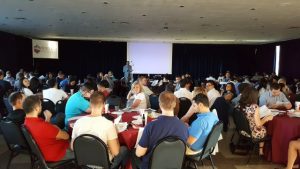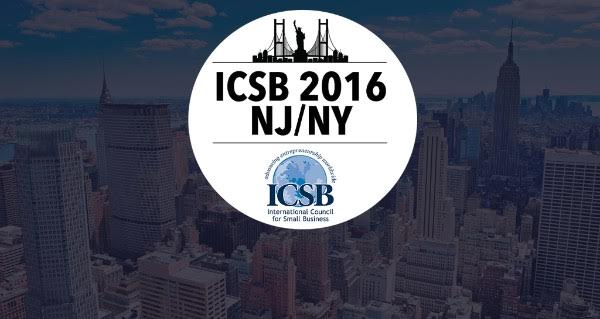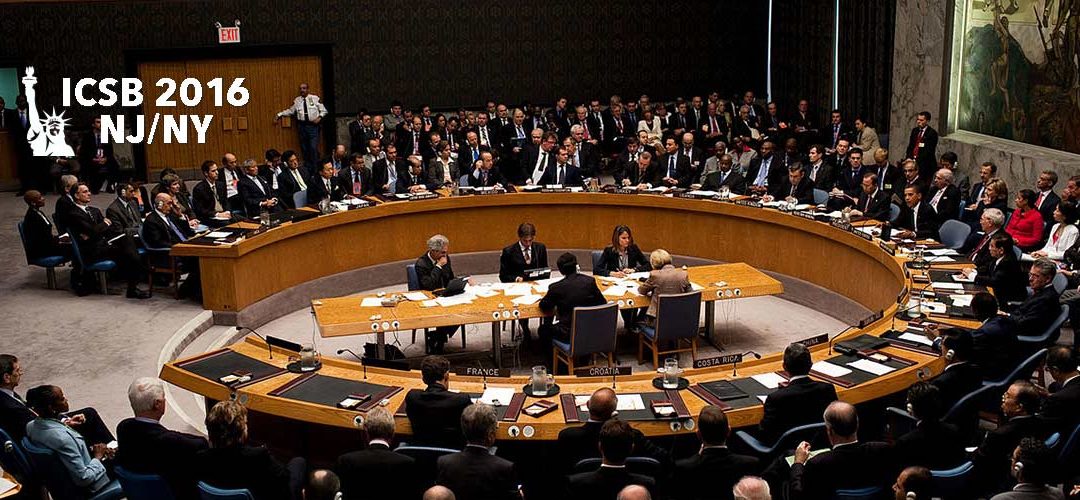
by ayman@gwu.edu | Jun 13, 2016 | ICSB 2016, ICSB Bulletin, The Latest

When we designed the ICSB Academy Program, our objective was to further enforce ICSB’s mission to facilitate learning related to entrepreneurship. We also wanted to inject enthusiasm, energy, and creativity in our conference by designing a program that was targeting younger participants — both as aspiring entrepreneurs and/or running diverse ventures. This is one of the fundamental pillars of ICSB.
With that in mind, we sought out a global faculty of experts in all domains with a passion to teach. We also needed a host university and some great partners to help with all the logistics. We are proud to say that the ICSB Academy vision and efforts are coming together with an electrifying opening kicked-off by our incoming ICSB President, Dr. Luca Iandoli.
Some quick facts to showcase ICSB 2017 Academy:
-
18 countries represented!
-
141 Students 🙂
-
Average Age of 2017 cohort is 26 years old.
We want to Thank Stevens Institute of Technology for opening their classrooms, campus, and dorms for our ICSB Academy Students. We also want to thank New Jersey Institute of Technology for supporting our Academy activities and hosting a lunch! Please see the full ICSB Academy Program at www.ICSBAcademy.org
You also have to download the ICSB App to see the pictures and posts from our Academy students! To download, click here: https://attendify.com/app/jfs7pc/
Tomorrow the ICSB Academy starts working on the Core Modules.
More to come..

by Sam Lee | Jun 10, 2016 | ICSB 2016
The Official ICSB 2016 June 15th-16th World Conference Program is here! Click below to access our program schedule to see all of our speakers, events, locations, and more!
DOWNLOAD THE PDF HERE!!: ICSBWorldConference_June15and16Program

by info@icsb.org | Jun 6, 2016 | ICSB 2016
This year, the ICSB World Conference has the great honor of hosting its first day at the headquarters of the United Nations in New York City. How much do you know about the UN? Check out a few fast facts.
United Nations: In the Beginning
In 1941, representatives from 14 countries and exiled governments met in London for a conference that began planning for a new world organization. Then-U.S. President Franklin Delano Roosevelt suggested that the organization be called the “United Nations.” The Declaration of United Nations was drafted in 1942. The UN charter was drafted in 1945 and was ratified by 51 countries between August and December of that year.
First Resolution
The UN adopted its first resolution in January of 1946, in the wake of the atomic bombings of Hiroshima and Nagasaki. The resolution called for the elimination of atomic and other weapons of mass destruction, as well as the peaceful use of atomic power.
The United Nations has subsequently issued many more resolutions. The Security Council alone has issued almost 2,300 since its inception.
Eight Secretaries-General
The United Nations is led by a Secretary-General, who functions as both an administrator and a spokesperson for the body. Just eight men have held that position:
- Trygve Lie (Norway) from 1946-1952
- Dag Hammarskjöld (Sweden) from 1953-1961
- U Thant (Myanmar) from 1961-1971
- Kurt Waldheim (Austria) from 1972-1981
- Javier Perez de Cuellar from 1982-1991
- Boutros Boutros-Ghali (Egypt) from 1992-1996
- Kofi A. Annan (Ghana) from 1997-2006
- Ban Ki-Moon (Korea) from 2007-present
UN Headquarters in South Dakota?
New York City wasn’t the immediate choice for the location of the UN headquarters building. Other sites under consideration included the Black Hills in South Dakota and Navy Island in upstate New York, near Ontario, Canada. Instead, U.S. philanthropist John D. Rockefeller donated money to purchase the site where the UN headquarters were built, on the East River in New York City. The headquarters building was opened in January of 1951 and completed in October of 1952.
Six Official Languages
While most day-to-day business is conducted in English and French, statements made by delegates are simultaneously translated into each of the six official languages of the United Nations. They are Arabic, Chinese, English, French, Russian, and Spanish.
ICSB 2016 at the UN
ICSB 2016 invites you to join us at the UN and at our subsequent sessions and events at the Stevens Institute of Technology in Hoboken, New Jersey. Register today to secure your seat at the conference.
by info@icsb.org | Jun 1, 2016 | Conferences, ICSB 2016
Egypt has been at the center of world events for centuries. If your job were to strengthen Egypt’s economic ties with the international community, where would you start? Since September of 2015, that has been the question that Egypt’s Minister of International Cooperation, Dr. Sahar Nasr, has had to answer.
About the Ministry of International Cooperation
The Ministry’s mission is to develop and support economic cooperation between Egypt and other countries, as well as with international and regional organizations. It also “advises the government on the standards and regulations for external borrowing and the receiving of foreign grants, reviews the disbursements and repayments of local borrowers in addition to the disbursements of beneficiaries from foreign grants. . .to ensure the achievement of economic development.”
About Dr. Sahar Nasr
Dr. Sahar Nasr is a professor of Economics at the American University in Cairo and a lecturer at several other universities. Since taking on the role of Minister of International Cooperation, her focus has been strengthening Egypt’s relationships with its international partners, as well as building new relationships with other countries and international organizations in Africa and Asia. In addition, Dr. Nasr heads the National Committee for the Follow-Up on the Implementation of the UN’s Sustainable Development Goals.
“My aim is to forge more partnerships with the international community and to mobilize resources with the objective of achieving inclusive and sustainable economic growth,” Dr. Nasr said upon taking her position as Minister. “Job creation, especially for youth and women, is on the top of my agenda. Supporting lagging regions and enhancing access to markets is key in that regard.”
About ICSB 2016
Founded in 1955, the International Council for Small Business (ICSB) was the first international membership organization to promote the growth and development of small businesses worldwide. The organization brings together educators, researchers, policy-makers and practitioners from around the world to share knowledge and expertise in their respective fields. Each year, ICSB members and affiliates come together to discuss relevant issues and share information at conferences all around the world.
This year, the ICSB World Conference will take place at multiple locations in New York and New Jersey. The conference kicks off at United Nations Headquarters on June 16, and then moves to the Stevens Institute of Technology on June 17 and 18. Registration is open to the public, but limited and expected to sell out. ICSB 2016 will focus on the role of entrepreneurship and innovation in advancing the UN New Sustainable Development Goals.
For more information about the conference, or to secure your seat, please click here or visit the ICSB’s website at http://ICSB.org/.
by info@icsb.org | May 31, 2016 | Conferences, ICSB 2016
Each year, the ICSB World Conference hosts a pre-conference Doctoral Consortium. At the Consortium, doctoral candidates in the field of small business and entrepreneurship can present their research, receive feedback on their scholarship, and meet experienced faculty.
The Doctoral Consortium also provides new researchers and more advanced scholars with an opportunity to share their ideas and experience. The Consortium offers doctoral candidates a chance to network with people in their field.
ICSB Doctoral Consortium FAQ
When does the Doctoral Consortium take place?
The Consortium is on June 15 from 9:00 am to 5:00 pm, the day before ICSB 2016 begins.
Where is the Doctoral Consortium happening?
The Consortium will be located at the Stevens Institute of Technology, at 1 Castle Point Terrace in Hoboken, NJ.
Who are the students who participate in the Consortium?
As many as twenty doctoral candidates are chosen to attend the Consortium. Attendees are chosen from applicants who are in the advanced study of entrepreneurship, and who intend to pursue an academic career. Students from across the globe are encouraged to apply.
How can I apply to attend the ICSB Doctoral Consortium?
The application deadline for this year has passed, but please consider applying next year.
Are doctoral students eligible for a discount to the full conference?
They are. The conference fee for doctoral students is only $575 and includes access to all conference sessions, the welcome reception, coffee breaks and buffet lunch during conference days, and the gala dinner.
About ICSB 2016
This year, the ICSB World Conference will take place at multiple locations in New York and New Jersey. On June 16, we will be at United Nations headquarters, and then we will move to the Stevens Institute of Technology on June 17 and 18. Registration is open to the public, but it is limited and expected to sell out. ICSB 2016 will focus on the role of entrepreneurship and innovation in advancing the UN New Sustainable Development Goals.
For more information about the conference, or to secure your seat, please click here, or here if you are a doctoral candidate.
by info@icsb.org | May 30, 2016 | Conferences, ICSB 2016, The Latest
In September of 2015, the United Nations adopted seventeen Sustainable Development Goals (SDGs). The SDGs aim to ensure that global development in the next 15 years is socially, economically, and environmentally sustainable. These goals were unanimously adopted by the UN’s 193 member states.
While entrepreneurship has a role to play in many of the goals, it has a particular impact on Goal 8: “Promote inclusive and sustainable economic growth, employment and decent work for all.”
Goal 8 Facts
- Global unemployment increased by nearly 19% between 2007 and 2012, from 170 million to nearly 202 million. 75 million of the unemployed are young people.
- Nearly 2.2 billion people live on less than $2 a day.
- Businesses and governments will need to create 470 million jobs for new entrants into the job market by 2030.
Goal 8 Targets
Goal 8 has an aggressive target of achieving full global employment by 2030. In the nearer term, Goal 8 aims to “reduce the proportion of youth not in employment, education or training” by 2020. Another target for goal 8 is to promote entrepreneurship and innovation “and encourage the formalization and growth of micro-, small- and medium-sized enterprises, including through access to financial services.”
How do SMEs affect Goal 8?
If the UN is to come close to achieving the objectives laid out in its Sustainable Development Goals, it will need help from the private sector. According to the World Bank:
Formal SMEs contribute up to 45 percent of total employment and up to 33 percent of national income (GDP) in emerging economies. These numbers are significantly higher when informal SMEs are included.
SMEs will be a critical factor in whether the world can attain full employment by 2030.
ICSB 2016 at the UN
ICSB 2016 gets its start at United Nations headquarters on Thursday, June 16. Our first conference session will address the role of SMEs in helping the world achieve the UN SDGs, including Goal 8.
ICSB 2016 invites you to join us at the UN and at our subsequent sessions and events at the Stevens Institute of Technology. Register today to secure your seat at the conference.




